Unit1
P2:Martha: I think it’s time we started thinking about our future and making decisions
about what we want to do when we finish this course.
John: Oh, Martha, you’re always so serious! We still have two months before we take
our final exams.
Martha: I know, but you can’t just suddenly wake up the day you finish college and
find a job. You need to plan.
John: You’re right, of course. But where do we start? The course we’re taking is
General Business and there are so many choices like Human Resources, Sales,
Marketing, Finance, and so on. And I’m not even sure what I’m interested in.
Martha: Yes, I know. There’s a lot to think about, but maybe we can start by thinking
about our specific interests in Business. For example, I think that you should go into
Marketing.
John: I’ve thought about that too, but I’m not sure. I suppose we should think about
our different strengths and weaknesses in each area. A job in Human Resources or
Management would probably suit you. You are bossy—you just love telling people
what to do!
Martha: Hey, that’s not true. It’s just that I like organizing people and I think I’m
pretty good at it.
John: Well, build on your strengths. I think we should also have a look at some ads
and find out what kinds of jobs are out there in the real world.
Martha: Okay. Let’s buy the newspaper every day this week and look at job ads in
Business. We could also go to some companies and find out what skills and
qualifications are needed for each department.
John: Good plan. I think maybe we should go see our college counselor too. She may
have some useful advice for us.
Martha: Let’s do that. I’ll call her office tomorrow and see when we can get an
appointment. I’ll arrange for both of us to see her.
John: Great! I’ve got to hurry. I have a class in ten minutes. Bye.
Martha: Okay. See you later.
P5: Mrs. Mills: Good afternoon, Martha and John. It’s good to find students who are
thinking about how to get a job.
Basically, it’s a process and certain steps need to be followed. Let me take you
through the most important ones.
But before we even begin we need to focus your search by matching your interests
with your skills, abilities, personality, training, and qualifications.
Now, I see from your files here that you are both taking General Business courses and
will graduate in June. The field of Business is very broad, so we need to think of your
particular strengths and what you do and do not enjoy doing.
For example, if either of you likes working with and helping other people you would
probably enjoy a career in Human Resources. The responsibility of the Human
Resources employee is to match the person with the position. Recruitment can be
done externally when a new employee is brought into the company or internally from
�
within the company, which might involve promotion. The HR department also looks
after staff development, welfare, and motivation. In other words, here you try to keep
everyone happy.
Now if that’s not you and you think you would enjoy the more aggressive side of the
business world, there is sales and marketing. There your focus is the customer and
convincing him to buy and for this kind of job you need to be tough.
And, of course, if you like precision and attention to detail, there is the world of
finance. This kind of job includes the many aspects of calculating expenses, profits,
revenue, and of course, investment.
You are going to have to give this some thought and not only about the jobs
themselves, but the kinds of companies where you can
work, which will make these jobs vary.
In the meantime, I can get you started on the form-filling, CV writing, and tips for
interviewing. So shall we begin?
P7: Martha: John, remember Mrs. Mills talked about strengths and weaknesses? I’ve
seen those on the applications and find it really hard to look at myself and decide what
my strengths and weaknesses are.
John: I know, my brother said it’s a matter of finding the balance between selling
yourself and what you are good at, but not making yourself sound perfect. In other
words, you need to be a bit critical of yourself without overdoing it. OK, so let’s
think and help each other out.
Martha: Well, John, I think you are really good at networking.You have a way with
people and making contacts that I think would be very good in sales and marketing.
John: Wow, thanks, Martha. You’re normally not so nice to me. As for you, I think
your skills are organizational. You are very good at planning and seeing things
through. This is definitely one of my weak areas. I think I’m just a bit lazy about
getting myself moving.
Martha: Well, John, I don’t think it’s a good idea to tell a prospective employer that
you’re lazy. You can’t completely hide the negative, but you need to put it in a more
positive way. How about saying that you might be considered a bit disorganized, but
that’s because you focus on the communication side of the task and you’re working on
your organizational skills. As for myself, I could say that some people might say that
I’m impatient, but this may be because I have a lot of drive and enthusiasm to get the
job done. I still organize myself and check everything as I go along.
P8: HR Manager: Your resume is a very important document and with your
application and cover letter it’s the employer’s first introduction to you, and the
measure of your suitability for the job. Remember that employers receive a lot of
applications, so you have to make all your documents as readable and as user-friendly
as possible.
The layout of your resume should be in a simple font, 11 or 12 point in Times New
Roman or Arial script. Your contact details should be up-to-date and the e-mail
address serious and not too much of an attention-grabber.
We generally advise people not to include age and marital status because some people
object to being asked these questions.Likewise, you don’t have to include information
�
about your religion though sometimes this question may appear on the application
form. It’s advisable to include all information about your work experience, including
temporary and part-time jobs since this will give the employer some insight into your
background in dealing with customers and working as part of a team. Of course, give
all relevant information about your education and include details on your involvement
in sports and volunteer work, too, because this shows your personality. Of course, you
should read the job ad carefully and follow the instructions given there. Make sure
that you get approval from your references before including their names on your
resume.Any questions?
P9: Manager: Jane, what was your overall impression of the applicants?
Jane: I was impressed with both, but for very different reasons.
Manager: Yes, I agree. Applicant 1 has quite a lot of experience—overall 20 years, but
is a little short in academic qualifications.
Jane: Yes, that’s true whereas Applicant 2 has an M.A. in HR, and a very recent one,
as well as a General Business degree. It’s very important
to have up-to-date
theoretical knowledge.
Manager: You’re right about that, but on the experience side don’t you think she’s a
little weak?
Jane: Of course, but she’s worked at that mortgage company, which has given her
some experience on the financial side of things whereas Applicant 1 has had more
experience, but in more general situations.
Manager: True, but look at the wide range of responsibilities he’s had in very
important HR areas at management levels.
Jane: But we’re looking for someone who’s a team player and that’s probably easier
for a person who’s new in the workplace. I wonder about the flexibility of a person
who’s been in management for so long.
Manager: Let’s invite them both for an interview and keep these questions in mind as
we’re interviewing.
Jane: Good plan. I’ll call them and make arrangements.
P11: John: Can I send an e-mail instead of a cover letter with my application?
Teacher: Yes, of course, if an e-mail address is included in the ad.
Martha: I know we use e-mail all the time and chat to each other, but can I use it in
the same way for business communication?
Teacher: No, definitely not. There are certain rules you have to follow—we call it
e-mail etiquette and it’s important that you follow all these conventions.
Martha: Sometimes we don’t use an opening greeting in our e-mails. Is that OK for
business e-mail?
Teacher: You should always open with a greeting and end with a final salutation.
When you don’t know the person, use the same opening as you would for a letter, that
is. Dear so and so . . . Make sure you add your signature at the end. If you’re sending
an e-mail to a colleague or friend you can just use the person’s name.
John: What about length? I don’t like reading from the computer screen and I hate it
when I get a long e-mail.
Teacher: I think most of us feel like you, John. It’s good to stick to one page—no
�
more than a letter-sized page if printed out. You should use paragraphs as well. When
you look at the cover letter you see it’s divided into paragraphs—you should do the
same on the e-mail.
John: Can I depend on the computer to do the spell-check and grammar-check?
Teacher: No, not really because, as you know, that feature is not always available on
the e-mail program so make sure you check and edit it yourself. Remember also that
it’s OK to add gimmicky things like smiley faces when e-mailing friends and family,
but never in a business e-mail.
P12: Speaker: Knowing how to prepare and behave is one of the keys to a successful
interview. First impressions are based on appearance, so it is very important to pay
attention to how you dress. Wear clothes that are fashionable, but appropriate and
never show up for an interview in flashy loud clothing. This gives a very poor
impression and possibly causes interviewers not to take you seriously. Remember,
before you go to the interview, do your homework and find out all you can about
the company. Then when you go inside you can relax and be natural. Wait for the
interviewer to invite you to sit down and be formal and polite in your opening
greeting. Never say anything negative about a past employer even if you have had
unpleasant experiences in your last job. Don’t be afraid to keep eye contact with your
interviewers and try to avoid giving short answers to questions. You can direct the
flow of the interview by developing your answers.
P13: Interview 1
Interviewer: Have you checked out our company on the Net?
Interviewee: Yeah, there’s a lot of stuff out there.
Interviewer: Were you impressed with what you read?
Interviewee: Yep, sounds pretty good.
Interviewer: Are you interested in working for us?
Interviewee: Yeah, I think so.
Interview 2
Interviewer: What appeals to you about working for a company like ours?
Interviewee: Well, from what I have researched I think working with your company
would be very challenging and would also give me the opportunity to learn and
interact with experts in my field.
Interviewer: What kind of asset do you feel you would be to the company?
Interviewee: Well apart from the qualifications and experience that I have, I also feel
that I am a highly motivated person who is capable of working in a team or alone.
Interview 3
Interviewer: So, you’re interested in joining our company.
Interviewee: Yes, that’s right.
Interviewer: Do you know anyone who works in the company at the moment?
Interviewee: Yes, I have a couple of friends who are working here.
Interviewer: And what have they told you about the company?
Interviewee: That you are all very nice and helpful.
Unit2
�
Lesson1
F:In the traditional approach to selling, the salesman was someone who did it because
he couldn’t find another job. Selling often meant sticking your foot in the front door,
bullying your way into a home, or conning the person into coughing up for a product
that they may or may not need like a set of encyclopedias for the children. These days
the image of the salesperson has changed drastically and a lot of preparation and
psychology have gone into turning out a good salesperson. Still it does help if you
have certain personality characteristics before you start. A person who’s able to
quickly pick up on the personality traits of another and build on this insight to create
an emotional link is likely to succeed at sales. Such a salesperson recognizes the
indecisiveness of a prospective customer and helps them make up their mind in favor
of the product. It’s important that the salesperson likes people and is able to tune into
their different needs and wants. It’s also important to be a good listener and pay
attention to the value system of the customer. It’s also a good idea to sell products that
interest you as this makes selling easier.
Lesson2
F:Salesperson: Good morning. Can I speak with Geraldine Murray, please?
Woman: Speaking. How can I help you?
Salesperson: My name is William Cosgrave and I work for Telefast, a cost-cutting
company that will reduce your phone bill by at least half. I hope this is a convenient
time to talk.
Woman: Well, I am a little busy right now . . . What’s it about?
Salesperson: Oh, I’m sorry. I hope you received the brochure we sent out on how to
cut your phone bills in half.
Woman: No, I didn’t receive anything, but if there’s a genuine way to help reduce my
phone bills, count me in. Can you give me a quick explanation?
Salesperson: Certainly. It’s quite simple. I can send you information on the different
deals that we offer. If you’re interested, just complete the application form and send it
back. We have a special offer if you sign up this month. For just $6.99, you get all
local calls free for one month and after that a 50% reduction on these calls. And if you
make international calls at off-peak times, there is a 40% reduction and a 25%
reduction at busy times.
Woman: Hmm . . .
Salesman: Just give me your address and I’ll send out
the information today.
Remember, if you want the free calls for a month, you need to apply right away. Can I
just check that I have your correct address?
that sounds interesting. How do I sign up for this?
Lesson3
F: Today, I am going to give you some advice regarding ,what to do and what not to
do when giving a presentation. It’s important to remember that though your purpose is
to inform and share with your audience, you should select what they can comfortably
deal with in a single sitting and not overload them with minute details. The next thing
you must ensure is that you arrive organized for your presentation with your notes in
�
order. The content should be organized in a logical way and you should inform your
audience of this layout in your introduction. Make sure you do not wander into asides
and unrelated comments. Stick to the main point. Also, it’s important to establish a
good rapport with the audience and to make eye contact with your listeners. Don’t
shout or whisper, but speak clearly and loud enough for everyone to hear. Keep your
voice at a comfortable speed. Finally, conclude by summing up the essential points
and then ask if anyone has any questions.
G: Presenter #1: Hi, everyone. Good to see you all here and thanks for coming along.
I hope you will find my topic interesting and not boring. Okay, let’s start, shall we?
Can you all sit down and listen, please? Right now, where are my notes? Hmm . . .
they’re in a bit of a mess. Hang on a minute while I get organized.
Presenter #2: Good afternoon, everyone! Welcome and thank you for coming along to
the presentation. Today, I would like to look at some recent trends in the sales of
organic produce,
especially through supermarket outlets. The talk will last about
forty minutes and then we will have about ten minutes at the end for discussion, so
please save your questions until then.
Presenter #3: So, we’ve looked at how the Organix Company got started and we have
considered one of their principal achievements. Before considering their other two
important accomplishments, let’s take a quick look at the management structure of the
company. Now does anyone have any suggestions as to what
those two other
accomplishments are?
Lesson4
A: Kathy: Good morning. Furniture Wholesalers. Can I help you?
Benson: Hi. This is Craig Benson here from Hooliers Hotel.
Kathy: Oh, hi, Mr. Benson. How are you? It’s been a while.
Benson: Yes, hasn’t it? I think it’s been over a year since we talked. How’s business?
Kathy: Very good. We’ve expanded. We opened a new warehouse about six months
ago and took on five new employees.
Benson: That’s great! I hope you are not too busy to fill our order. We’ve expanded
also and need lots of new furniture.
Kathy: Oh, that’s great. So how can we help you?
Benson: Well, first I need to know if we can have a rush on this order since it’s
coming up to summer. We need to have it delivered before May 15.
Kathy: I’ll have to check with deliveries. Let me know what you need and then I’ll get
back to you.
Benson: Fine. Right, let’s see—10 double beds, 20 single beds, 30 closets and
matching dressers. That’ll do for now but I think we’ll also need some dining room
furniture.
Kathy: Okay, that’s 10, 20, 30, and 30. Let me call you back in an hour or so after I’ve
checked delivery availability. Then I can get all the details for delivery if it is possible.
E: Sales: . . .
so, I’ll need to set up a new account for you, especially if you say that
you want to become a regular customer. First of all, let me have the name and address
�
of your business.
Buyer: Okay, the name of the restaurant is Totally Natural and the address is 43
Riverside Way, Delham.
Sales: Delham . . . Right, that’s just inside the limit of our delivery service. Now just
give me an account number that we can use for all our transactions. With this number,
it’ll be easy to find your account details each time you call.
Buyer: I see. Okay, let’s use 1979. It’s easy to remember as it’s the year I was born.
Sales: Okay. We put TF in front of that, which stands for Truck Freight. So, when you
call, please quote TF-1979, which is your purchase order number. Now what can we
prepare for you today?
Buyer: Today we need 5 pounds of cauliflower, 10 pounds of potatoes, and 8 pounds
of onions.
Sales: Right. That, according to our codes, is 5 x #05, 10 x #04, and 8 x #02. Items
will be delivered first thing tomorrow morning.
Lesson5
B:Situation 1
Customer 1: Hi, I was in your store last week and I bought myself a jacket. I wore it
for a few days, but I really didn’t like the color. I’m wondering if I can exchange it or
get my money back.
Situation 2
Customer 2: Good morning. I’m calling about the digital camera that I bought
yesterday. When I tried to use it today the zoom lens didn’t work. I’d like to return the
camera and get a replacement or talk with someone who knows something about the
camera who can perhaps guide me through the process.
Situation 3
Customer 3: Hi, there. I just picked up a TV at your store yesterday afternoon and
when I was taking it out of the car it sort of accidentally fell. It looks okay, but the
picture is pretty fuzzy. Do you think I can have someone look at
it or get a
replacement or a refund?
E:Situation 1
Customer: Good afternoon. I would like to speak with the manager, please.
Salesperson: Why? What’s your problem?
Customer: Well, I bought this DVD here three weeks ago and have had several
problems with it in that short time. Each time, I bring it back here, someone looks at it,
adjusts something, and says it’s okay. But then when I get home it doesn’t work.
Salesperson: Hmm . . . Are you sure you know how to operate this machine?
Customer: Young man, I’ve
one has ever spoken to me like this before.
Salesperson: Okay, okay. I’ll get someone to have a look at it.
Situation 2
Customer: I’m returning this jacket because it’s not really the right fit and it’s sort of
heavy.
been a customer at this store for several years and no
�
Salesperson: I’m very sorry, sir, but that jacket was boughtduring the sales and the
store policy is no refunds on goods bought during sales.
Customer: Oh, be reasonable! It’s just a jacket. I’m sure you still have some others
inside. Surely you can exchange just one jacket.
Salesperson: Sir, it’s impossible. Our policy clearly states “No exchange on sale
items.” I can’t do anything to help you, I’m afraid.
Customer: Oh, this is ridiculous! I’m never going to shop here again!
Situation 3
Customer: I just bought this new TV and when I got home it didn’t work.
Salesperson: Okay, if you could wait a moment, I’ll have someone look at it.
Customer: Look, I have been waiting for five minutes! I can’t stand here all day. I
have to get back to work. Listen to me. I need this TV to be fixed right now or I need
a replacement!
Salesperson: Please stop yelling. The service manager is busy right now and so you’ll
have to wait.
Customer: I’m not going to put up with any more of this. Call the manager right now!
Lesson6
Speaker: The Internet has expanded our choices of where and when to shop, but it
also has its hazards. Here are some things that you should think about before
becoming an Internet shopper.
It is safer to buy from reputable companies, so do a little research on the company
before making your purchase. Check carefully all the contact details of the company.
Look for a street address and a landline telephone number, not just an e-mail address.
Also, consider any extra costs—things like shipping costs and taxes—that you may
have to pay and decide if it’s actually worthwhile buying online.
Generally, people pay for online goods with credit cards. Make sure that the site is
secure. At the bottom of the page, you should see a small “s”—which stands for
“secure”—along with a picture of a padlock. Make sure you keep copies of the order
form and the acknowledgement notice that you receive.
When you buy online, you have the same legal rights as when you buy in a store.
However, it’s very important to read all the terms and conditions of the sale before
you buy.
Always check your bank statement after making a purchase andmake sure that only
the amount that you paid has been deducted from your balance.
Each country has its own consumer affairs offices that should be able to advise you if
you find that you have been cheated while shopping online. The most important thing
to remember is “If in doubt, don’t buy.”
P116: James Thompson grows organic vegetables. He used to sell exclusively to a
large supermarket. One day, he had to request a postponement of a meeting with a
buyer. The buyer arrogantly and rudely refused his request. James felt angry at the
supermarket and decided that he needed an alternative sales outlet to make him more
independent. He began to deliver his vegetables door to door. That was 10 years ago
�
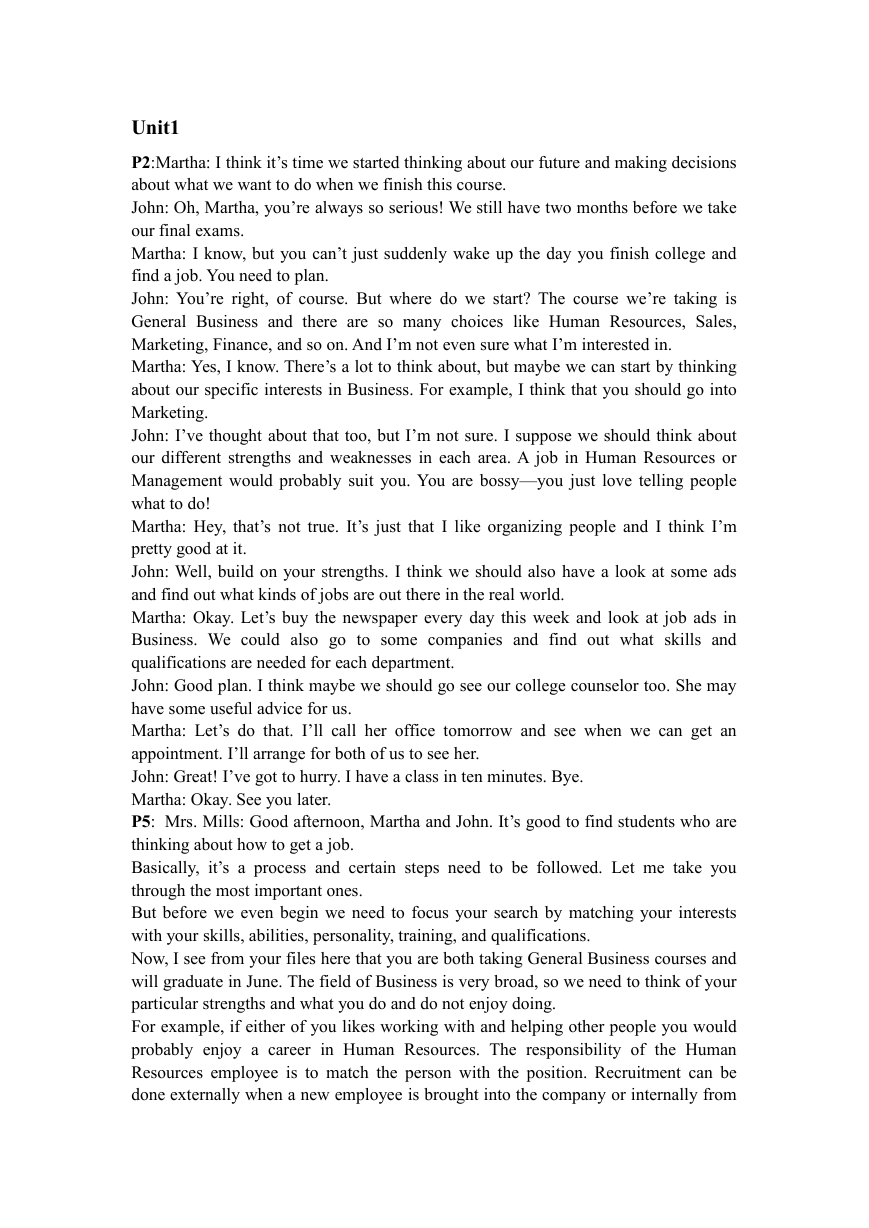
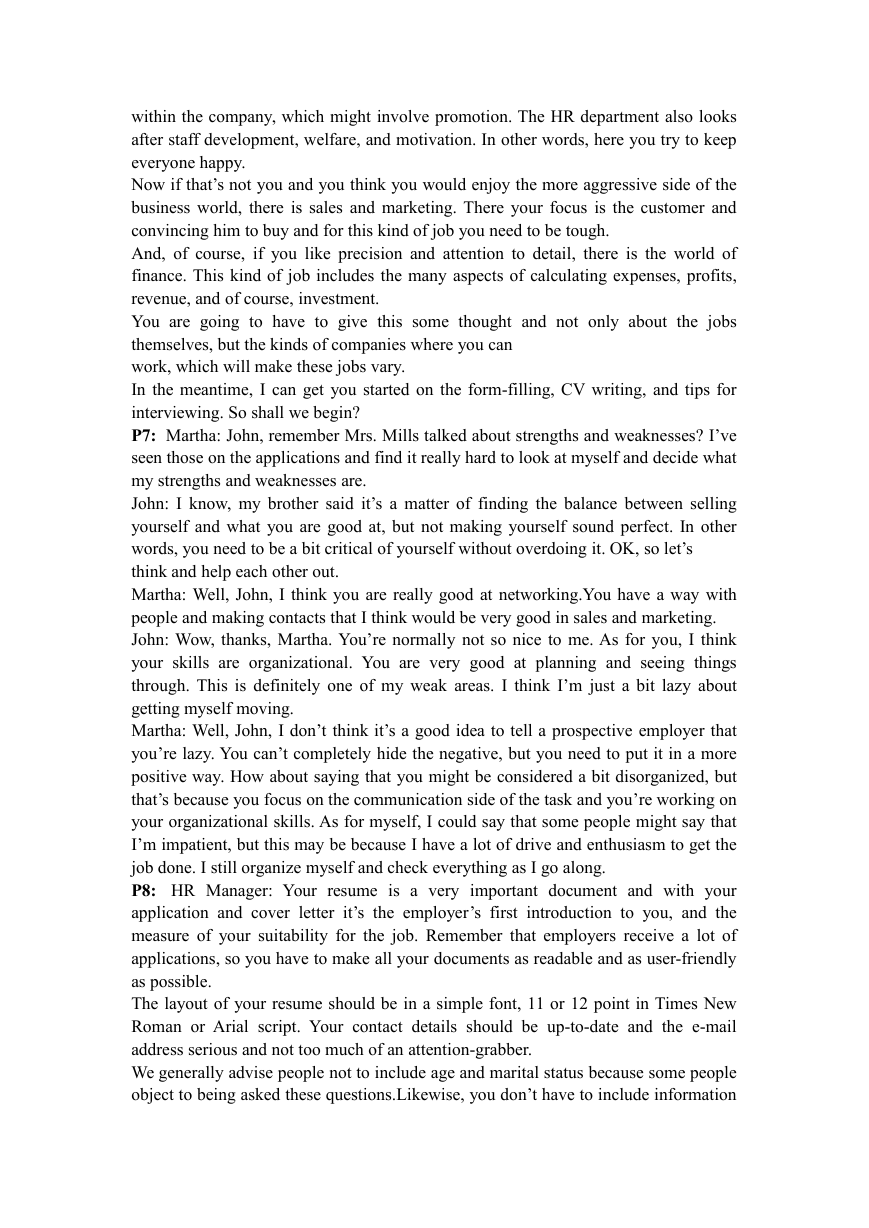
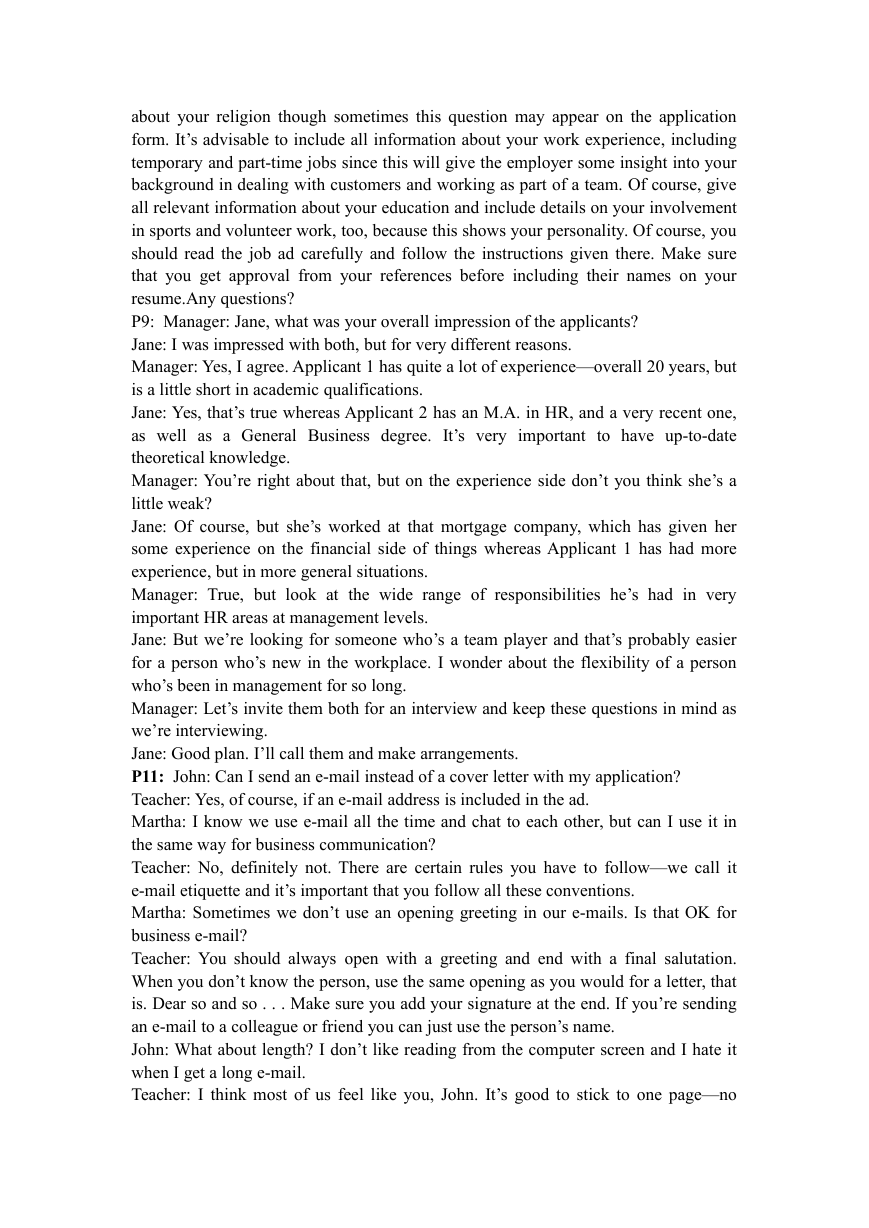
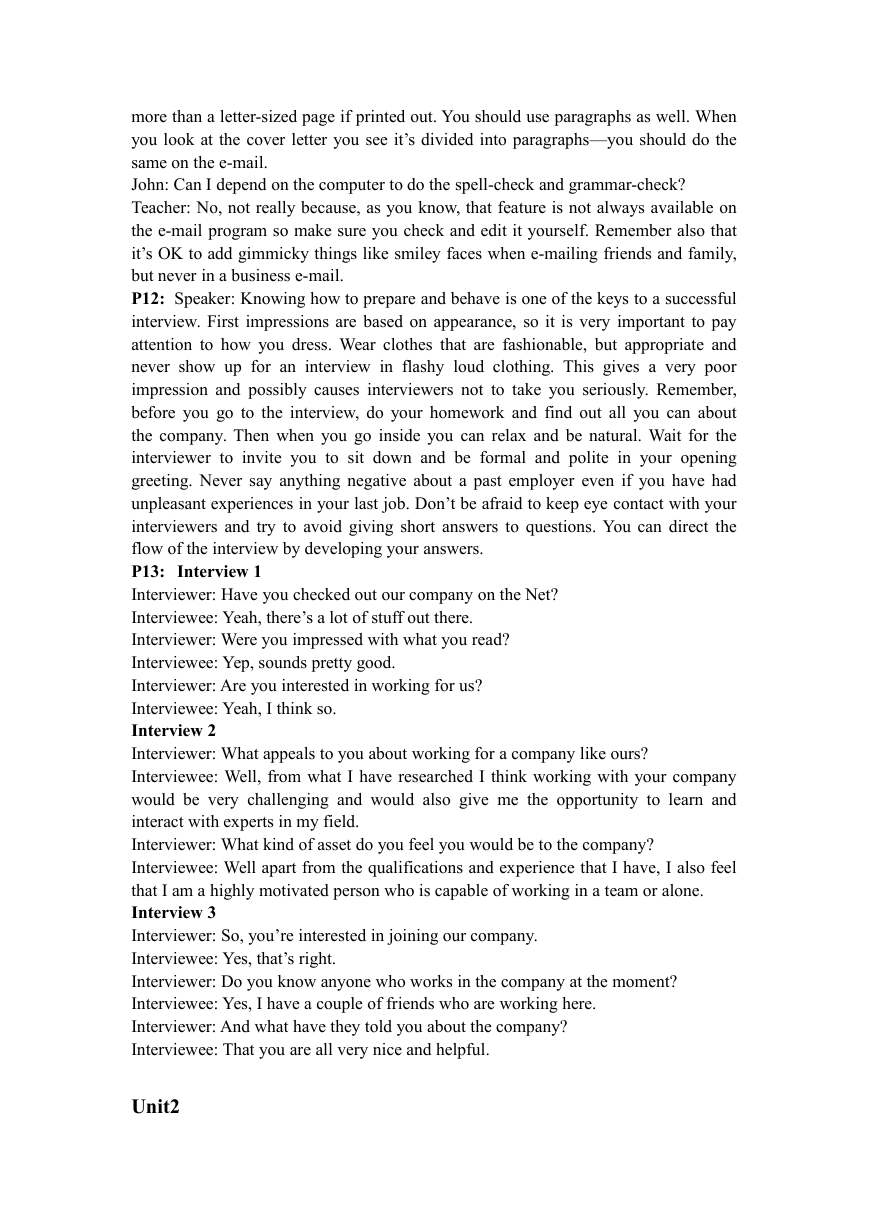
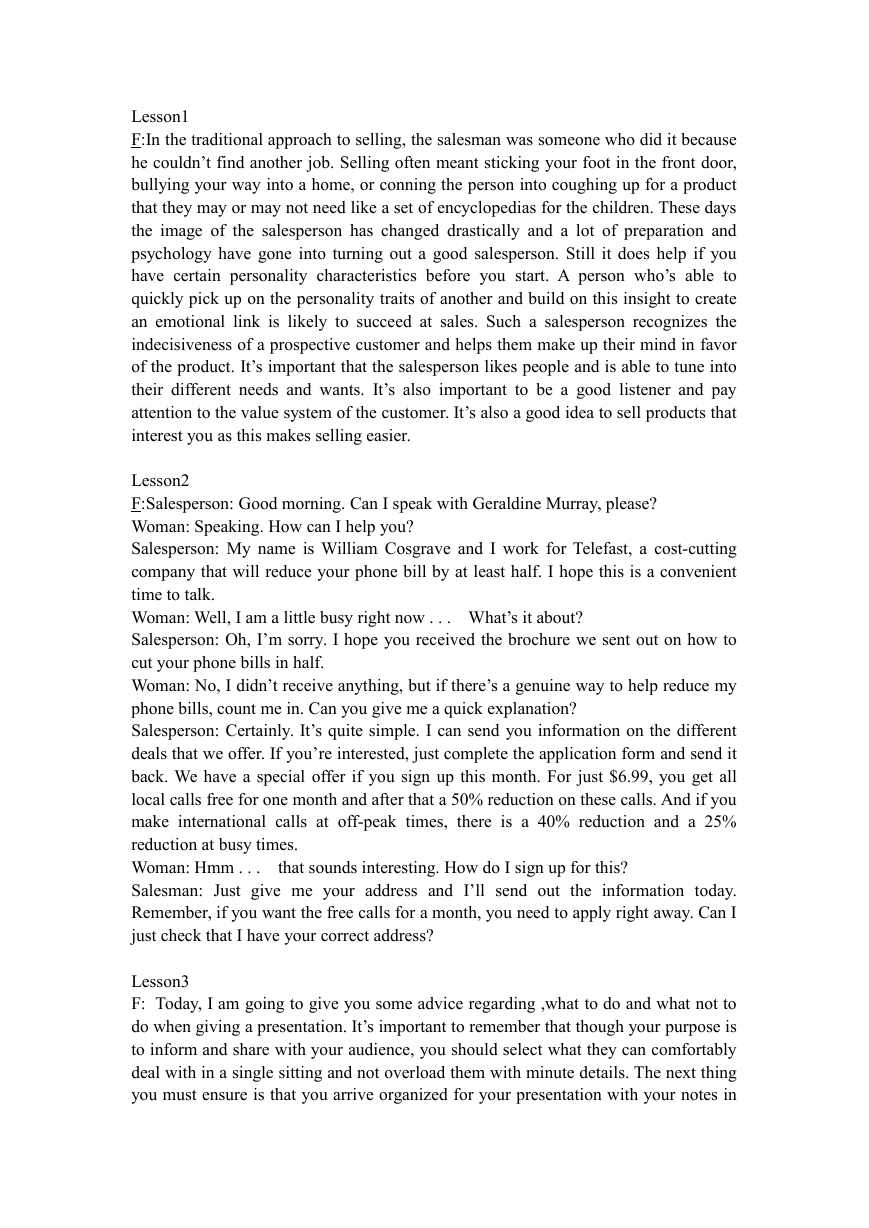
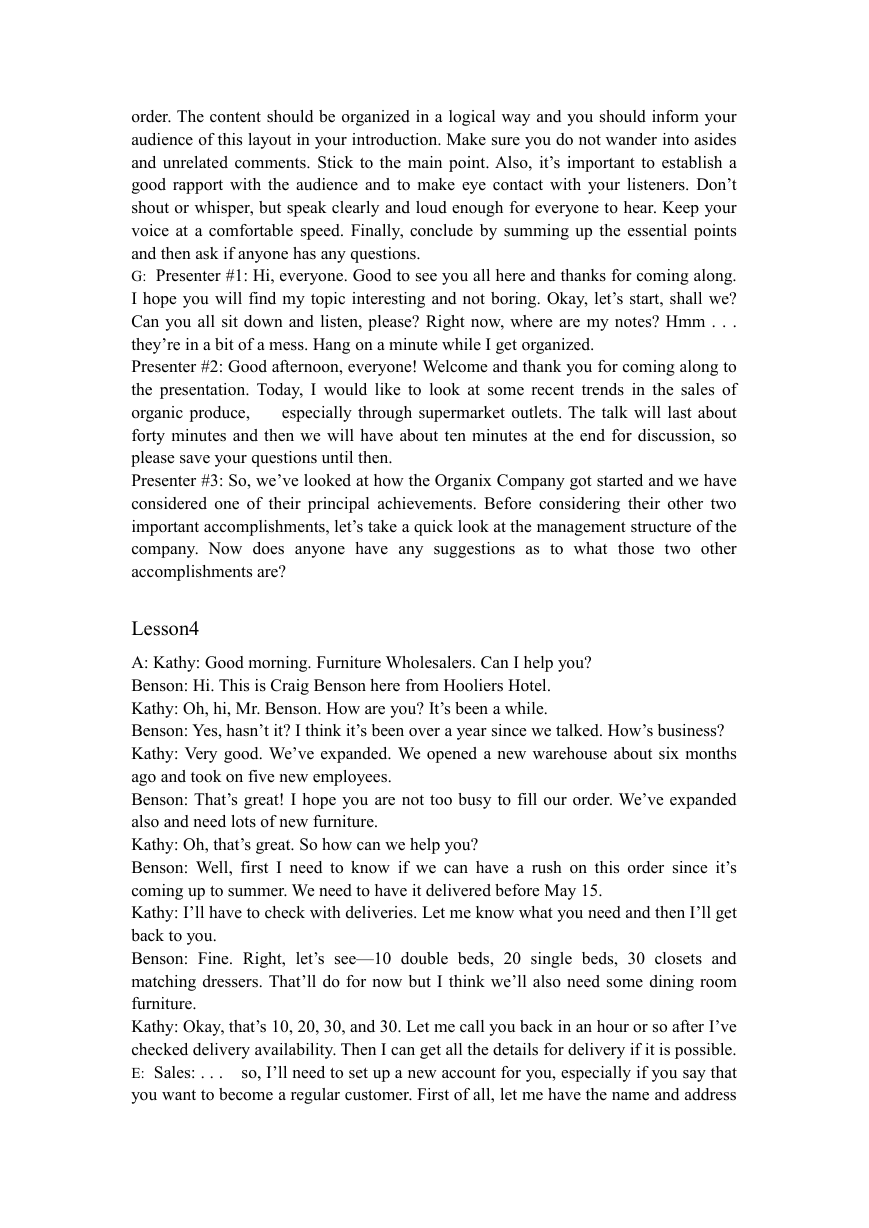
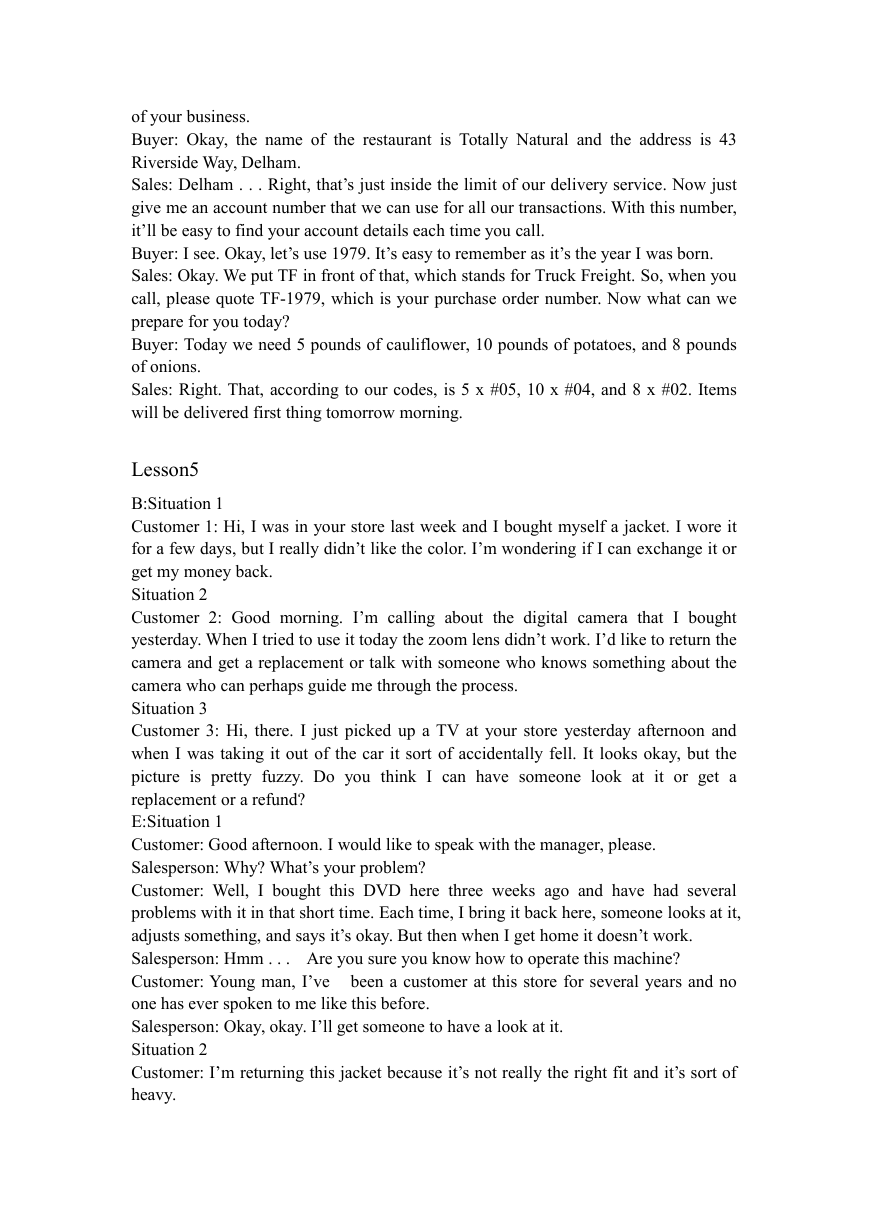
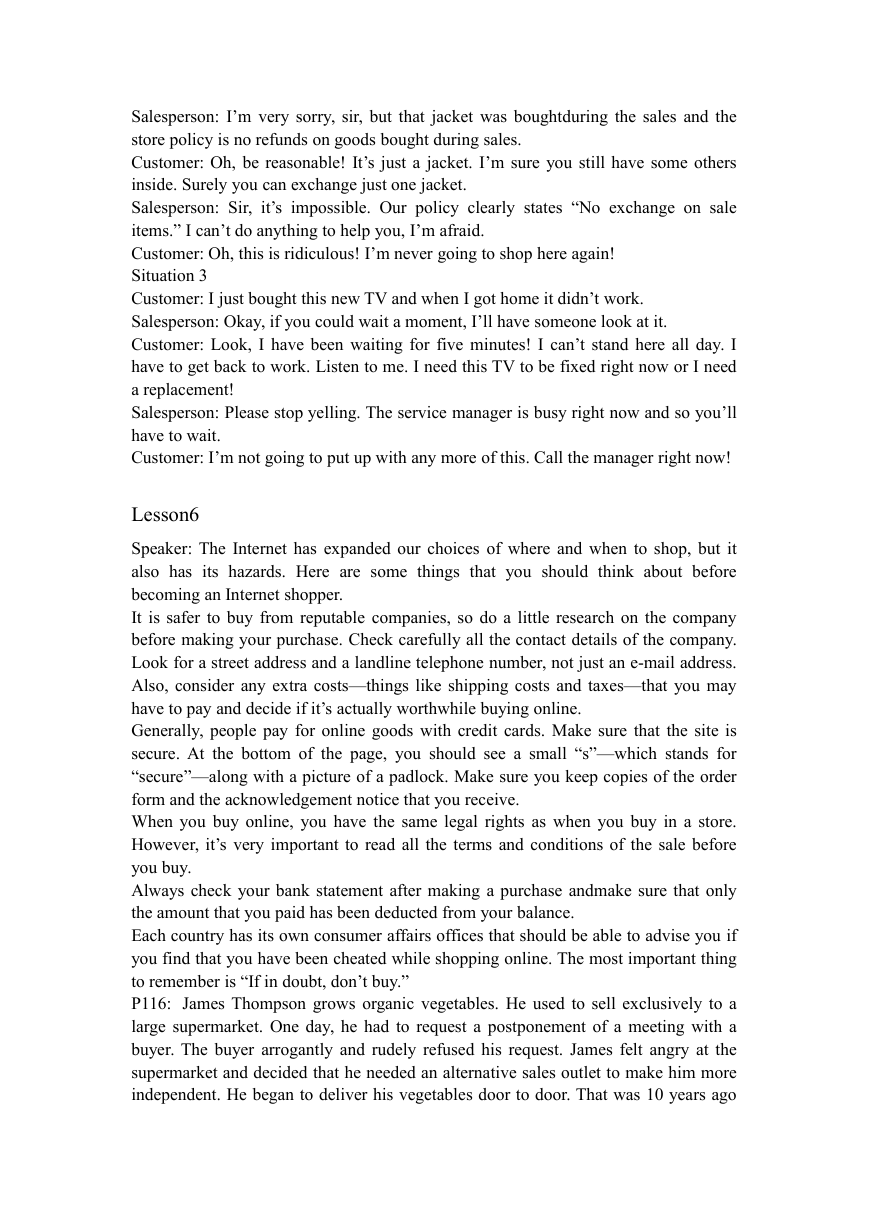








 2023年江西萍乡中考道德与法治真题及答案.doc
2023年江西萍乡中考道德与法治真题及答案.doc 2012年重庆南川中考生物真题及答案.doc
2012年重庆南川中考生物真题及答案.doc 2013年江西师范大学地理学综合及文艺理论基础考研真题.doc
2013年江西师范大学地理学综合及文艺理论基础考研真题.doc 2020年四川甘孜小升初语文真题及答案I卷.doc
2020年四川甘孜小升初语文真题及答案I卷.doc 2020年注册岩土工程师专业基础考试真题及答案.doc
2020年注册岩土工程师专业基础考试真题及答案.doc 2023-2024学年福建省厦门市九年级上学期数学月考试题及答案.doc
2023-2024学年福建省厦门市九年级上学期数学月考试题及答案.doc 2021-2022学年辽宁省沈阳市大东区九年级上学期语文期末试题及答案.doc
2021-2022学年辽宁省沈阳市大东区九年级上学期语文期末试题及答案.doc 2022-2023学年北京东城区初三第一学期物理期末试卷及答案.doc
2022-2023学年北京东城区初三第一学期物理期末试卷及答案.doc 2018上半年江西教师资格初中地理学科知识与教学能力真题及答案.doc
2018上半年江西教师资格初中地理学科知识与教学能力真题及答案.doc 2012年河北国家公务员申论考试真题及答案-省级.doc
2012年河北国家公务员申论考试真题及答案-省级.doc 2020-2021学年江苏省扬州市江都区邵樊片九年级上学期数学第一次质量检测试题及答案.doc
2020-2021学年江苏省扬州市江都区邵樊片九年级上学期数学第一次质量检测试题及答案.doc 2022下半年黑龙江教师资格证中学综合素质真题及答案.doc
2022下半年黑龙江教师资格证中学综合素质真题及答案.doc